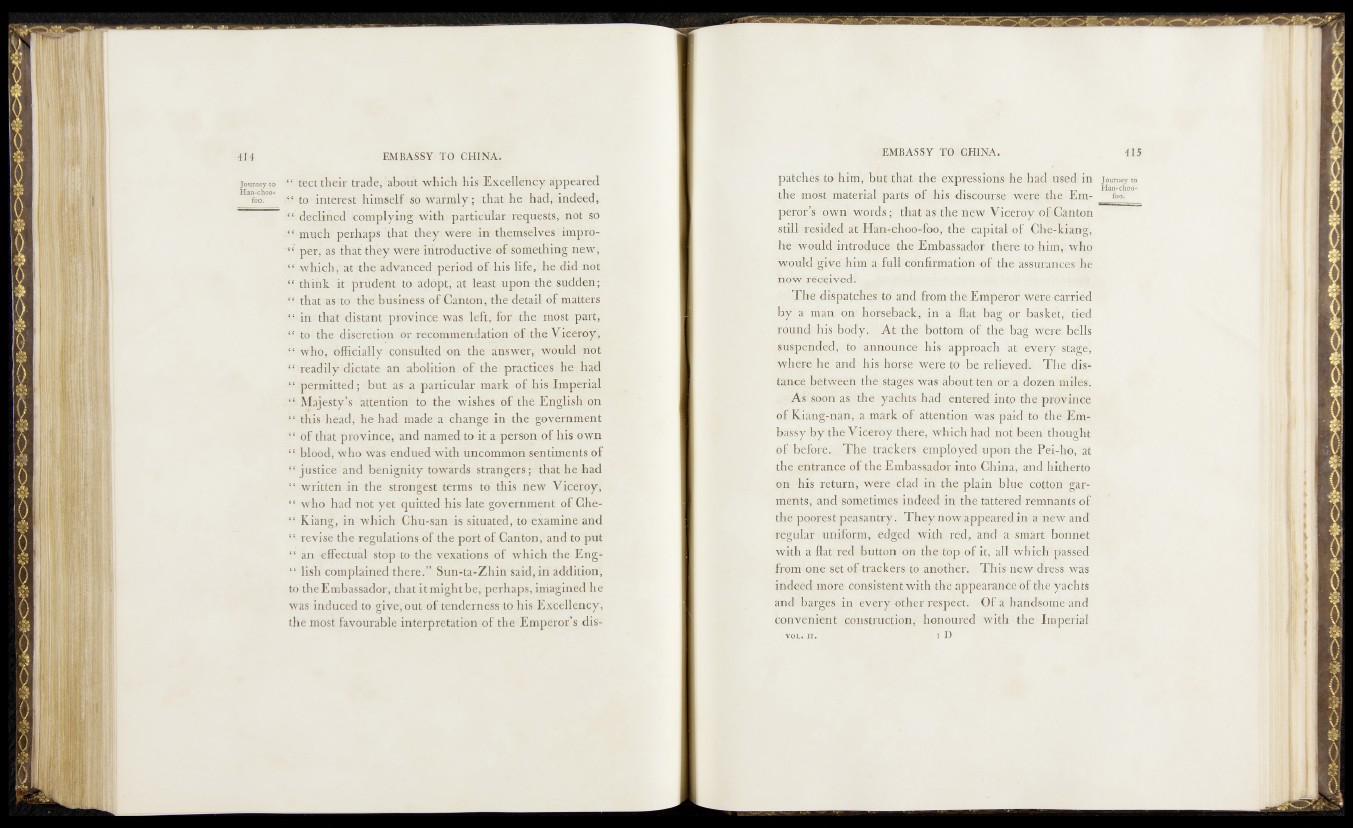
foürney tô
Han-choo- MBlMI M
tect theiç trade/ aboxit which his" Eixeelle'hdy^ $p pleaded
<Mto' interest himself'so warmly ; athati fee - had,Jinideedj
illdwetei^ed’ teoirfplyin g «with partidLSarireguests,- - not
-■“ -much? perhaps that theynwere in themselvesjimj*i'i|-
■ « per] a? that they were iritroductive-of something ®ew,
“ which, at the advancedvperiod.of,his life,lhbdid, hdt
“ think it prudent to adopt J afe; ]m^U|pon-the, suddep;
“ that as to the business of'Canton, the détail o f .matters
“ in that distant’ province was ffeft$<fojdtthegrm>st.part,
tfee dtWrstion' or recommendation of the Viceroy,
“ who, offiteial-ly consulted'on the answer,]Mtoidfttyibt
“ freaeKly-dictate an abolition of the practice«-* hé^'haH
“ -permitted but as a particular markvoflhi&Jmperial
“ Ma|eifcy^iht^itioh to th e f wishesjoftthe Englishjçaa
“ this hittl, he had madejaneharige in the .govQiwflSftt
éiiof ihat^rohincOj' and named to it a personf$fd}is>dwO
“ blOod, who was endued with uncomnjph^sentiments of
i»justice-and benignity towards strange^s^thahhe'had
“ wrifctên in the strongest terms'.to 'this rlew Viceroy*
“ who had not yet- quitted hi© late government of:,GJae-
“ Kiang, in which Chu-san- is situated, to examine arid
im #etfs&the -regulations of the peat dECaritondand CSjput
à ;an eôeetual stop to the vexations, df which the Eng-
“ lish complained there.” Sun-ta-Zhin said, in addition?,
to the Embassador, that it might beÿ perhaps, imagined he
was induced to give,ottfe of tenderness toihis Excèlleney;
thé most favourable interpretation o f the Emperor’s dis»
jSl^he^o^lp^^but^ha^te^l^^FeSsfoy^he ha|l msediin
jKe!;«|i^^ppt'|?iah parts« o f - his'discoilFSB wedl the-Em-
pfeto^^Qwni^ ^ i#K;nh>atM ^ he^n6W^Yi^irdyA)feCanton
Hap-^h-Os©|p^/ tfaSS capital of - [<§)he-kiang*,
lfeow0u-P^wo4^^^^:-&^i^^i^li|'.thfe'r@:’.to him, Who
woWM^gllf^Krn.' }a foil ’eohfirmatp>®ibk thi*a|sojal4akes;^fe
rMfO*(bspak hr'sfel»’ a1nd> hjom the Eraptboi*•wsdin'ca-i 1 ic'd
b y l^ jfi^ o n ^ g ^ s lb ^ c k ; "in*.'a- Iflijejlbag'* or ba'sfeOt,»'tigd
suspende’dv!\to bgp-n§u.ncW Jds^appJOaish *atji^§¥0i$t‘a'g,d,
T^ b ^ ec ho* and^bl^h^isdiAyefce to ’
hfe't^l!^|,§^!i4S^4fo^b|te-n orda* dozJen^de’si
As- toon’ ast^Me^yachts-had-i entered feftp dhef pr-e^iritfe
of'Kiahg-n-MjX^.mM-k^^fattention'^^asIp'aid1 to tholEjffi^
bass^y|^|tte^i6®l'©^itbere, -Which thoiig'fet
The ,|r.aek.ers- ^mpi(3.y'edi^ip,<Srl <t>hfe* Pei-fho^tat
the,4entrance of the Embassador into- China, and hitherto
o-niohis return, were.clad-pf| the plaint-bllpWOrton''garv
m©nt-s, - and - sometimes • indeed in. -‘the' tattered' remnants of
thH|^{^NIB.ti|*<t(santry« Thoy^naw*appea«edin a new and
Tegular 'uniform, edged . .with- red,fa®fd>’ia3 Sfnart 'bonnet
with a flat red button 'on the^®p|fofdt,|lp| wMicK^l^is'sed'
from on#)s©Cd€* tfrag-k#sit6 .a’n'otlh'frl-? ThiSf^w1 ®re¥s #as
indeed, more con^istent-with tl^c(pp€&r&n^jgS£ t'hfe^yahhts
and' barges in every- other respect. Of a* hahd’sdfafe^and
convenient ^construction, honoured w ith ; the-’Imperial
VOL. IX. ■ l)